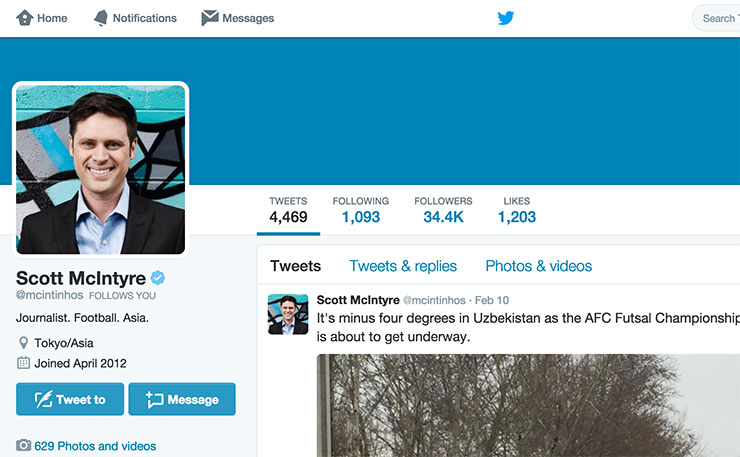A saga that saw an SBS journalist fired after sending a series of Tweets on ANZAC day, accusing ANZAC soldiers of committing war crimes during the Second World War, has come to a prosaic conclusion, with a joint statement signalling an end to the legal fight over the dismissal.
While neither side was able to discuss the terms of the confidential settlement, reached on the eve of the trial’s beginning, SBS confirmed it had pulled a statement issued at the time of the incident which had been highly critical of the journalist.
In may 2015, SBS football journalist Scott McIntyre lodged a complaint with the Fair Work Commission after his employment was terminated as a result of four Tweets he had authored a month earlier. In the Tweets, sent from his personal account, the journalist described the bombing of Nagasaki and Hiroshima as “the largest single-day terrorist attacks in history” and criticised “widespread rape and theft” by ANZAC soldiers.
The statements provoked a backlash fuelled by conservative commentators and gained traction with the help of two Federal government ministers. Then Communications Minister Malcolm Turnbull responded via Twitter and called SBS’s Managing Director to register his dissatisfaction.
Difficult to think of more offensive or inappropriate comments than those by @mcintinhos. Despicable remarks which deserve to be condemned.
— Malcolm Turnbull (@TurnbullMalcolm) April 25, 2015
McIntyre was also slammed on Twitter by SBS Managing Director Michael Ebeid.
Comments from @mcintinhos are his own, disrespectful and not at all the views of @SBS. We remember and commemorate our ANZACs. — Michael Ebeid (@michaelebeid) April 25, 2015
McIntyre subsequently took the matter to Fair Work, with his lawyers arguing he had suffered adverse action from his employer as a result of his political opinions.
The case was likely to hinge on the extent to which the Fair Work Act protects political opinion, and what responsibilities employees have outside of work hours.
Josh Bornstein, an employment lawyer at Maurice Blackburn, the firm that represented McIntyre, said the area was relatively untested, and that employers were more regularly sued on the grounds of race, sex, or age-based discrimination than for taking adverse action against an employee as a result of their political opinion.
In a Federal Court hearing, SBS responded that the dismissal had simply been triggered by a breach of the network’s social media policy.
But a statement issued today by McIntyre’s lawyers and SBS said the issue had now been resolved.
“SBS acknowledges that Mr McIntyre was a well respected sports reporter with SBS for a period spanning over a decade, and SBS is disappointed that it was unable to continue with his services following his Tweets,” it said.
“Mr McIntyre acknowledges that the views expressed in his Tweets on 25 April 2015 were his views and that they were contentious. Mr McIntyre regrets any attribution of his views to SBS and acknowledges that SBS was drawn into controversy following the expression of his views.”
The statement did not divulge the terms on which the parties had come to the agreement.
While McIntyre’s original tweets remain online, an aggressive statement issued by SBS at the time of the dismissal has now been deleted by the network.
The media statement, issued the day after the Tweets were sent, and attributed to Ebeid and Director of Sport Ken Shipp, confirmed McIntyre’s dismissal and accused the reporter of compromising “the integrity of the network and audience trust”. The page where the statement was previously posted remains online but has had all its text deleted, leaving it blank.
A spokesperson for SBS said it could not respond to specific inquiries about the decision to remove the statement.
“This has been the subject of a legal process. The joint statement released today reflects SBS’s position,” they said.
Aside from the culture-wars brouhaha McIntyre’s dismissal inspired, the incident also raised concerns about the increasing pressure on journalists and other professionals to utilise their social media presence for the benefit of their employer. The MEAA, the union which represents journalists, warned broad but vague social media policies “have begun to infringe on the private lives of media professionals, dictating what they can and can’t say in a private capacity, outside of their work.”
Bornstein said the case had been about free speech. Though he declined to comment on whether journalists in Australia should be pleased or concerned by the outcome of the McIntyre case, he said it raised the following question for the industry: “Is the weather man at the ABC allowed to knock-off work and then go and participate in a Reclaim Australia rally or an international socialist forum, or will he or she be hunted down and sacked for engaging in democratic processes out of work hours?”
While McIntyre’s Tweets have stuck to football of late, Bornstein didn’t feel the same need to hold back when reflecting on the outcome of the incident.
I dedicate the settlement of Scott McIntyre’s court case to the vigilantes & hypocrites who got him sacked https://t.co/HqVgDZ5ByM
— Josh Bornstein (@JoshBBornstein) April 10, 2016
Donate To New Matilda
New Matilda is a small, independent media outlet. We survive through reader contributions, and never losing a lawsuit. If you got something from this article, giving something back helps us to continue speaking truth to power. Every little bit counts.





